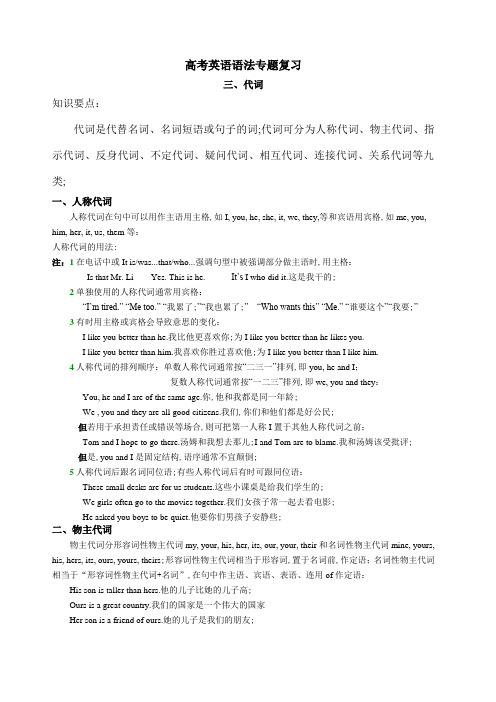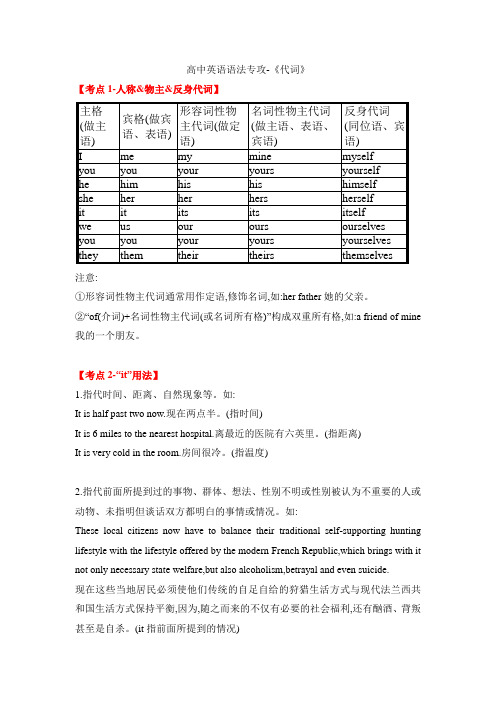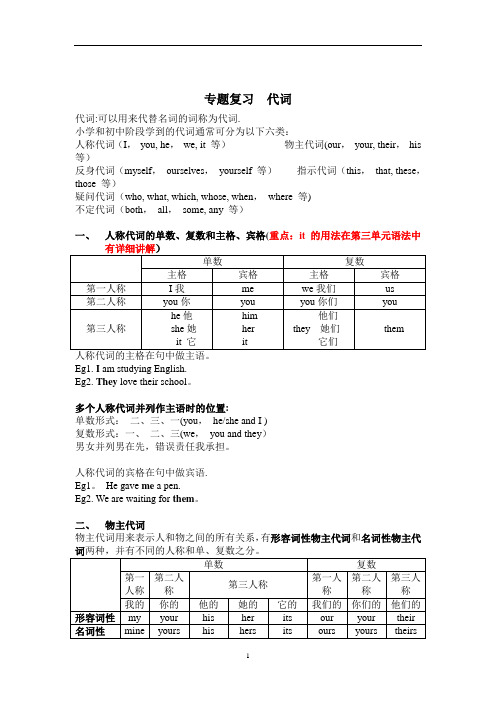代词英语语法专题
高考英语语法专题复习代词

高考英语语法专题复习三、代词知识要点:代词是代替名词、名词短语或句子的词;代词可分为人称代词、物主代词、指示代词、反身代词、不定代词、疑问代词、相互代词、连接代词、关系代词等九类;一、人称代词人称代词在句中可以用作主语用主格,如I, you, he, she, it, we, they,等和宾语用宾格,如me, you, him, her, it, us, them等:人称代词的用法:注:1在电话中或It is/was...that/who...强调句型中被强调部分做主语时,用主格:---Is that Mr. Li ---Yes. This is he. It’s I who did it.这是我干的;2单独使用的人称代词通常用宾格:“I’m tired.” “Me too.” “我累了;”“我也累了;”“Who wants this” “Me.” “谁要这个”“我要;”3有时用主格或宾格会导致意思的变化:I like you better than he.我比他更喜欢你;为I like you better than he likes you.I like you better than him.我喜欢你胜过喜欢他;为I like you better than I like him.4人称代词的排列顺序:单数人称代词通常按“二三一”排列,即you, he and I;复数人称代词通常按“一二三”排列,即we, you and they:You, he and I are of the same age.你,他和我都是同一年龄;We , you and they are all good citizens.我们,你们和他们都是好公民;但若用于承担责任或错误等场合,则可把第一人称I置于其他人称代词之前:Tom and I hope to go there.汤姆和我想去那儿;I and Tom are to blame.我和汤姆该受批评;但是,you and I是固定结构,语序通常不宜颠倒;5人称代词后跟名词同位语;有些人称代词后有时可跟同位语:These small desks are for us students.这些小课桌是给我们学生的;We girls often go to the movies together.我们女孩子常一起去看电影;He asked you boys to be quiet.他要你们男孩子安静些;二、物主代词物主代词分形容词性物主代词my, your, his, her, its, our, your, their和名词性物主代词mine, yours, his, hers, its, ours, yours, theirs;形容词性物主代词相当于形容词,置于名词前,作定语;名词性物主代词相当于“形容词性物主代词+名词”,在句中作主语、宾语、表语、连用of作定语:His son is taller than hers.他的儿子比她的儿子高;Ours is a great country.我们的国家是一个伟大的国家Her son is a friend of ours.她的儿子是我们的朋友;This is your pen. Mine is in the box.这是你的铅笔,我的在铅笔盒里;注:1 a friend of mine ours, yours, hers, his, theirs结构2 物主代词与own连用;表强调;也可用of one’s own置于名词后作定语:Mind your own business.别管闲事;I saw it with my own eyes.那是我亲眼看到的;I hope to have a room of my own. / I hope to have my own house.我希望有自己的房子;三、指示代词指示代词是用来指代或标记人或事物的代词,表示“这个,这些”“那个,那些”;在句中可作主语、宾语、表语、定语;单数:this, that;复数:these, those;为了方便学习将such,so也归于此类;I like these and he likes those.我喜欢这些,他喜欢那些;What I want to say is this.我想说的就是这点;注:1 指示代词用作主语和定语时,可指人或物;用作宾语和表语时,只指物;如:This is my father. 作主语,指人Do you know this作宾语,指物,译为“你知道这个情况吗2 刚提到的或已经完成的事情时用that,但是若要指下文将要发生或将要提到的事情通常用this:She married Jim, and that surprised me.她嫁给了吉姆,这使我感到很吃惊;I want to know this: Is he healthy我想知道这一点:他是否很健康;3 在打电话时,通常用this指自己,用that指对方:Hello. This is Jim. Is that John喂,我是吉姆,你是约翰吗4 such指代前面所述的这样的人或事;如:Such is Albert Einstein, a famous physicist, but a simple man. 这就是艾尔伯特,爱因斯坦,......5 so代替一个句子或短语表达的事情;a.在believe,expect,suppose,imagine,think等词后用so代替前文观点;表肯定、否定=not均可;b. 用于表示肯定的hope,I’m afraid后,代替前文提出的观点;四、反身代词反身代词是oneself根据所指词的人称、性别、单复数等变化的词单数:myself, yourself,himself, herself, itself, 复数:ourselves, yourselves, themselves,在句中可作宾语、表语、同位语,不能作主语; 注:1用作同位语加强被修饰词的语气,紧放在被修饰名词后,或句末:The box itself is not so heavy.箱子本身并不重;You yourself said so. / You said so yourself.你自己是这样说的;2用作宾语动词或for,of, in, by, to等介词的宾语:She could not make herself understood.她不能使别人听懂她的话;You’ll have to see if he has come for yourself. for one self 亲自,为自己The computer may shut off of itself. of oneself 自动的You shouldn’t leave the child at home by herself. b y oneself 独自,单独Jim isn’t bad in himself, but he likes playing tricks on others. in one self 本身He likes a table to himself. to oneself 独自占用3 用作表语:有时用于be, feel, seem, look等后作表语表示身体或精神处于正常状态:The poor boy was myself.那个可怜的孩子就是我自己;The ones who really want it are ourselves.真正想要它的是我们自己;I'm not quite myself these days.我近来身体不大舒服;I'll be myself again in no time.我过一会儿就会好的;4 含有反身代词的动词短语:devote oneself to=be devoted to 专心于;lose oneself=be lost in 迷失;seat oneself= be seated 坐下; express oneself 表达某人的思想; say for oneself 为自己找借口;say to oneself 心想; talkto oneself 自言自语; feel oneself 觉得正常; come to oneself 苏醒;五、疑问代词疑问代词包括who, whom, whose,which, what,在句中可用作主语、表语、宾语、定语等:1、who与whom的用法:前者为主格,用作主语、宾语,后者为宾格,用作宾语;Who spoke at the meeting Whom are you talking about口语中或作宾语的whom位于句首时,通常可用who代替,但whom前有介词时除外:Whom is the letter from2、whose的用法:表示“谁的”,既可用于名词前作定语,也可单独使用;在句中作主、宾、表、定语;Whose is better, yours or hers作主语Whose do you love better, yours or hers作宾语Tom has already taken his bag is this作表语Whose bag do you like作定语3、what和which的用法:有选择范围时,多用which;无选择范围或不明确时,多用what;拓展:what的习惯用法:1 What...for... 和What for 用于询问原因和目的;---What did you put it into the soup for --- It would improve the taste.你为什么...---I’m going to the grocery store. ---What for We still have enough food in the apartment.为何啊(2)What if...表示假设、建议、征求意见或疑虑;What if it rains while we are on the way(3)What do you mean by...表示愤怒、不满等情绪;What do you mean by shutting the door so loudly(4)What/How about...用于征求对方意见、询问对方的情况;(5)疑问词what构成的固定搭配;So what那又怎么样呢表示不感兴趣或认为不重要What next店员用语还要什么Guess what你猜怎么着用于引起他人的注意What can I do for you你要买借什么4、what和who的区别:一般来说;what问职业、地位等,who问姓名或关系等:Who is he他是谁What is he他是干什么的六、相互代词相互代词只有each other和one another,它们在句中通常只用作宾语:We should help each other.我们应该互相帮助;They respect one another.他们互相尊重对方;The sea and the sky seem to melt into each other.大海和蓝天似乎融为一体;注:1相互代词在句中通常只用作宾语,不可作主语,所以以相互代词为宾语的句子不能变为被动语态;2不要将相互代词误认为是副词,将其用作状语,如可说talk to each other,但不能说talk each other;3相互代词可以有所有格形式:The students borrowed each other's notes.学生们互相借笔记;4有时可分开用:We each know what the other thinks.我们都知道对方的想法;七、不定代词1.不定代词概说;英语的不定代词有all, each, both, either, neither, one, none, little, few, many, much, other, another, some, any, no,few,little, both, enough, every等,以及由some, any, no和every构成的合成代词即somebody, anyone, nothing等;在这些不定代词中,多数都能作主语、宾语、表语或定语,但是代词none以及由some, any, no和every构成的合成代词只能作主语、宾语或表语,不能作定语,而no和every则只用作定语;2.指两者和三者的不定代词;有些不定代词用于指两者如both, either, neither,有的不定代词用于指三者如all, any, none, every,注意不要弄混:Both of my parents are doctors.我的父母都是医生;All of the students are interested in it.所有的学生对此都很感兴趣;There are trees on any side of the square.广场的每一边都种有树;He has two sons, neither of whom is rich.他有两个儿子,都不富有;He has three sons, none of whom is rich.他有三个儿子,都不富有;注:each可用于两者、三者或三者以上,而every只用于三者或三者以上,因此用于两者时只能用each,不能用every;如不能说There are trees on every side of the road.3.复合不定代词的用法特点;复合不定代词包括something, somebody, someone, anything, anybody, anyone, nothing, nobody, no one, everything, everybody, everyone等;它们在句中可用作主语、宾语或表语,但不能用作定语;something, someone等和anything, anyone等的区别与some和any的区别一样,前者一般用于肯定句,后者一般用于否定句、疑问句或条件句参见any & some;具体使用时应注意以下几点:1复合不定代词受定语修饰时,定语应放在它们后面:There is nothing wrong with the radio.这收音机没有毛病;Have you seen anyone anybody famous你见过名人吗2指人的复合不定代词若用作主语,其谓语动词一般用单数,相应的人称代词和物主代词也用单数he, him, his 不一定指男性;但在非正式文体中常用复数代词they, them, their:Everyone knows this, doesn't he don't they人人都知道这一点,不是吗If anybody anyone comes, ask him them to wait.要是有人来,让他等着;3指事物的复合不定代词若用作主语,谓语动词只能用单数,相应的人称代词也只能用it,而不用they:Everything is ready, isn't it一切都准备好了,是吗4anyone, everyone等只能指人,不能指物,且其后一般不接of短语;若是指物或后接of短语,可用any one, every one 分开写:any one of the boys books孩子们书当中的任何一个本every one of the students schools每一个学生一所学校4.是any not还是not any;按英语习惯,any以及含有any的复合不定代词用于否定句时,它只能出现在否定词之后,而不能在否定词之前:误:Any one doesn't know how to do it.正:No one knows how to do it.任何人都不知道如何做它;误:Anybody Anyone cannot do it.正:Nobody No one can do it.这事谁也干不了;误:Anything cannot prevent me from going.正:Nothing can prevent me from going.什么也不能阻挡我去;5.不定代词与部分否定;不定代词all, both, every等与not连用时构成部分否定;若要表示完全否定,则需换用none, neither, no one等;比较:All of the students like the novel.所有这些学生都喜欢这本小说;Not all of the students like the novel.并不是所有这些学生都喜欢这本小说;All of the students don’t like the novel.并不是所有这些学生都喜欢这本小说;None of the students like the novel.这些学生当中没有一个喜欢这本小说;6.all, both, each等用作同位语;若用作主语同位语,主语可以是名词或代词;若用作宾语等其他成分的同位语,则宾语等成分必须是人称代词,而不能是名词:We have all read it.我们都读过他;all修饰的主语是代词The villages have all been destroyed.村庄都被毁了;all修饰的主语是名词They told us all to wait there.他叫我们都在那儿等;all修饰的宾语是代词但不能说:They told the men all to wait there. all修饰的宾语是名词不是代词7.so little与such little的区别;用so little还是such little取决于little的意思:若表示数量方面的“少”,则用so little;若表示形状体积的“小”,则用such little:He has so little time for reading.他读书的时间少得可怜;I've never seen such little boxes.我从未见过那样小的盒子;8.some与any的用法区别;一般说来,some用于肯定句中,any用于否定句和疑问句中;但是,在表示请求、邀请或征求意见的句子中,通常要用some而不用any:Would you like some cake吃点蛋糕吗Why not buy some bread为什么不买些面包呢Shall I get some chalk for you要我帮你拿些粉笔来吗注:any有时也用于肯定句中,此时表示“任何”:Any colour will do.任何颜色都行;Come any day you like.随便哪天来都可以;9.many与much的用法区别;两者都表示“许多”,但many修饰或代替可数名词复数,与few少数相对;而much用来修饰或代替不可数名词单数,与little少量相对;在口语中两者主要用于非肯定句中:Did you see many people there你在那儿看见许多人了吗We don't have much time.我们没有许多时间;在肯定句中,一般用a lot of, lots of, plenty of等代之;但在正式文体中有时也用于肯定句中;另外,若用作主语或主语的定语,或其前有how, too, as, so, a good, a great等修饰,也可用于肯定句中:Many of us left early.我们有许多人离开得很早;Much work has been done.许多工作都已经做了;You've given me too much.你已给我太多了;Take as many much as you want.你要多少拿多少;I asked her a great many questions.我问了她许多问题;10.few, a few与little, a little的用法区别;1few和a few后接可数名词的复数形式;few表示数量很少或几乎没有,强调“少”,含有否定意义;a few表示数量虽然少但毕竟还有,强调“有”,含有肯定意义:It is very difficult, and few people understand it.它很难,没有几个人能懂;It is very difficult, but a few people understand it.他虽难,但是有些人懂;2little和a little之后接不可数名词,其区别跟few和a few之间的区别相似:Unfortunately, I had little money on me.很不巧,我身上没带什么钱;Fortunately, I had a little money on me.幸好我身上带着一点钱;11.other, the other, another与others的用法区别:这些不定代词不仅在含义上有单复数之分,而且在用法上有泛指无the和特指有the之别;其用法区别可归纳如下:1指单数时,若泛指用another,若特指用the other:Give me another one.另外给我一个;Shut the other eye, please.请把另一只眼睛也闭上;2指复数时,若泛指用other后接复数名词,若特指用the other后接复数名词:There are other ways of doing it.做这事还有其他的办法;Where have the other students gone其他学生都到哪里去了3others永远表示复数意义且其后不能再接名词;其用法大致相当于“other+复数名词”,同样地the others大致相当于“the other+复数名词”:Other people Others may not think that way.别的人可能不这样想;He is cleverer than the others the other students in her class.他比班上其他学生聪明;4another一般只能表单数,且其后接名词也只能接单数名词;但是若其后有数词或few修饰时,则也可接复数名词:We need another few chairs.我们还需要几把椅子;In another two weeks it'll be finished.再过两个星期就可做完了;5与some对比使用时,用others此时与some同义:Some say yes, and others say no.有人说对,有人说不对;12.不定代词与语境考题;不定代词是高考的常考考点,有的不定代词考题出得比较灵活,不能死套规则,要注意结合语境来理解:1“Is ____ here” “No, Bob and Tim have asked for leave.”A. anybodyB. everybodyC. somebodyD. nobody若只是从表面来看,填空句是个疑问句,可能会误选A;但其实此题最佳答案应选B,因为下文的答句说“只有Bob和Tim请假了”,这说明问句是在查人数,故用Is everybody here 大家都到齐了吗2I agree with most of what you said, but I don't agree with _____.A. everythingB. anythingC. somethingD. nothing此句若从表面看,有可能误选B,因为填空句为否定句;但实际上最佳答案为A,因为上文说“我同意他说的大部分内容”,这与下文的but I don’t agree with everything但并不是同意他说的所有内容完全相符;3“Do you have _____ at home now, Mary” “No, we still have to get some fruit and tea.”A. somethingB. anythingC. everythingD. nothing答案选C,句意为“玛丽,现在家里东西都准备齐了吗”“还没有,我们还要买些水果和茶;”4“If you want a necklace, I’ll buy one for you at once.” “Oh, no. A necklace is not _____ that I need most. A. anythingB. somethingC. nothingD. everything此题容易误选A,机械地认为:something用于肯定句,anything用于否定句或疑问句;但是,此题的最佳答案是B,something在此的意思不是“某种东西”,而是指“那种东西”或“这种东西”,即心中最想要的那种东西相当于the thing;。
高考英语语法专题复习 :专题10 代词(代词知识点整理总结)

高考英语语法专项复习代词知识点整理总结距离高考还有一段时间,不少有经验的老师都会提醒考生,愈是临近高考,能否咬紧牙关、学会自我调节,态度是否主动积极,安排是否科学合理,能不能保持良好的心态、以饱满的情绪迎接挑战,其效果往往大不一样。
以下是本人从事10多年教学经验总结出的以下学习资料,希望可以帮助大家提高答题的正确率,希望对你有所帮助,有志者事竟成!养成良好的答题习惯,是决定高考英语成败的决定性因素之一。
做题前,要认真阅读题目要求、题干和选项,并对答案内容作出合理预测;答题时,切忌跟着感觉走,最好按照题目序号来做,不会的或存在疑问的,要做好标记,要善于发现,找到题目的题眼所在,规范答题,书写工整;答题完毕时,要认真检查,查漏补缺,纠正错误。
总之,在最后的复习阶段,学生们不要加大练习量。
在这个时候,学生要尽快找到适合自己的答题方式,最重要的是以平常心去面对考试。
英语最后的复习要树立信心,考试的时候遇到难题要想“别人也难”,遇到容易的则要想“细心审题”。
越到最后,考生越要回归基础,单词最好再梳理一遍,这样有利于提高阅读理解的效率。
另附高考复习方法和考前30天冲刺复习方法。
一、代词的分类二、代词的用法考点一it, that, one(s), those的用法1.it代替的是前面提到的同一事物,即同名同物,所代替的名词可以是可数名词,也可以是不可数名词。
如:I’d like to look at that atlas. May I borrow it?我想看看那张地图,我能借用一下吗(it代替可数名词atlas)?2.one叫作泛指代词代替的是前面提到的同名异物中的任何一个,所代替名词是可数名词单数,其前可带冠词与修饰语。
如果代替复数名词,则用ones。
如:①The population problem may be the greatest one in the world today.人口问题可能是当今世界上最大的一个问题。
高考英语语法专攻-《代词》-考点归纳+针对性练习

高中英语语法专攻-《代词》【考点1-人称&物主&反身代词】注意:①形容词性物主代词通常用作定语,修饰名词,如:her father她的父亲。
②“of(介词)+名词性物主代词(或名词所有格)”构成双重所有格,如:a friend of mine 我的一个朋友。
【考点2-“it”用法】1.指代时间、距离、自然现象等。
如:It is half past two now.现在两点半。
(指时间)It is 6 miles to the nearest hospital.离最近的医院有六英里。
(指距离)It is very cold in the room.房间很冷。
(指温度)2.指代前面所提到过的事物、群体、想法、性别不明或性别被认为不重要的人或动物、未指明但谈话双方都明白的事情或情况。
如:These local citizens now have to balance their traditional self-supporting hunting lifestyle with the lifestyle offered by the modern French Republic,which brings with it not only necessary state welfare,but also alcoholism,betrayal and even suicide.现在这些当地居民必须使他们传统的自足自给的狩猎生活方式与现代法兰西共和国生活方式保持平衡,因为,随之而来的不仅有必要的社会福利,还有酗酒、背叛甚至是自杀。
(it指前面所提到的情况)—Who’s that at the door?—It is the milkman.——门口那人是谁?——是送奶工。
(it指代性别不明或性别被认为不重要的人)—I’ve broken a plate.我打碎了一个盘子。
—It(=Breaking the plate) doesn’t matter.没关系。
高中语法专题 代词

代词人称代词:I, you, he, she, we, they, me, him, her….物主代词:my, your, mine, yours, their, theirs, its…反身代词:myself, himself, ourselves, itself…相互代词:each other, one another指示代词:this, that, these, those疑问代词:who, whom, whose, what, which…关系代词:who, whom, whose, which…连接代词:who, whom, whose, which不定代词:all, both, one, some, few, either, any, other, another, many, none…一、人称代词主格:I, you, she, he, their, we宾格: me, you, her, him, their, us(1) 宾格代替主格a.在简短对话中,当人称代词单独使用或在not 后,多用宾语。
---- I like English. --我喜欢英语。
---- Me too. --我也喜欢。
---- Have more wine? --再来点酒喝吗?---- Not me. --我可不要了。
b.在比较级的句子中than、as后用主格、宾格都可以 ,如:He is taller than I/me.但在下列句中有区别:I like Jack as much as her.=I like both Jack and her.I like Jack as much as she.=I like Jack and she likes him, too(2)两个以上的人称代词并列,其次序排列原则:在并列主语中,“I”总是放在最后,排列顺序为:二三一(人称)。
宾格me也一样。
You ,she and I will be in charge of the caseMr.Zhang asked Li Hua and me to help him(3)几个人称代词的特殊用法。
高考英语语法专项复习——代词

7) He doesn’t know how to express himself _____ in English. 8) With money in hand,the happy children went to buy ________ themselves some ice cream. 9) Mind you don’t hurt yourself ______with those scissors. 10)Life is not easy. One should enjoy oneself himself at times. _______/_______ 11) Listen! Someone has lockedthemselves _______ / ________ himself in the room. 12) “DIY” means “do it ________.” yourself
泛指 特指
单数 one (a+单数可数名词) the one=that (the+单数可数名词)
复数 ones (复数名词) the ones=those (the+复数名词)
注:口语中,特别是当后面有of短语时,多用that或 those;当有前置修饰语时,只能用one(s)。
His bag is newer than that of mine/me I like the red one.
6) Which one is right? Sometimes we teachers hardly know what you are thinking and doing. Sometimes our teachers hardly know what you are thinking and doing. 7) (07高考) …We thanked her for all the her trouble we had caused ____.
初中英语语法---代词专题(含练习)

专题复习代词代词:可以用来代替名词的词称为代词.小学和初中阶段学到的代词通常可分为以下六类:人称代词(I,you, he,we, it 等)物主代词(our,your, their,his 等)反身代词(myself,ourselves,yourself 等)指示代词(this,that, these,those 等)疑问代词(who, what, which, whose, when,where 等)不定代词(both,all,some, any 等)一、人称代词的单数、复数和主格、宾格(重点:it的用法在第三单元语法中Eg1. I am studying English.Eg2. They love their school。
多个人称代词并列作主语时的位置:单数形式:二、三、一(you,he/she and I )复数形式:一、二、三(we,you and they)男女并列男在先,错误责任我承担。
人称代词的宾格在句中做宾语.Eg1。
He gave me a pen.Eg2. We are waiting for them。
二、物主代词物主代词用来表示人和物之间的所有关系,有形容词性物主代词和名词性物主代形容词性物主代词不能单独使用,只做定语,用来修饰其后的名词。
Eg1。
My parents are both doctors.Eg2。
There’s something wrong with his bike.名词性物主代词应独立使用,后面不跟名词,相当于形容词性物主代词+名词,在句中可以作主语、宾语或标语.Eg1. Our classroom is on the second floor,and theirs is on the fourth floor. (作主语) Eg2。
Let's clean their room first, and then clean ours. (作宾语)Eg3。
中考英语语法专题—代词

中考英语语法专题—代词1.中考英语语法专题—代词篇1代词代词是代替名词的词类。
大多数代词具有名词和形容词的功能。
英语中的代词可以分为九类:人称代词、物主代词、反身代词、相互代词、指示代词、疑问代词、关系代词、连接代词和不定代词。
一、人称代词1、人称代词是表示"我"、"你"、"他"、"她"、"它"、"我们"、"你们"、"他们"的词。
人称代词有人称、数和格的变化,见下表:单数复数格主格宾格主格宾格第一人称i me we us第二人称you you you you第三人称he him they themshe her they themit it they them2、人称代词的用法(1)代词作主语时用主格,作宾语时用宾格:he has great concern for them. 他很关心他们。
they all like him very much. 他们都很喜欢他。
she gave the books to you and me. 这些书是她送给你和我的。
(2)人称代词作表语时,用宾格时较多,特别是在口语中,例如:who is knocking at the door?-it’s me. 谁敲门?-是我。
if i were her, i would take the advice. 我要是她就接收这个意见。
imagine yourself to be me. 设想你是我。
但在下面这种结构中却常用主格:it was he who did it.it is she who wants it.在表示比较的非正式的文体中,常用宾格代替主格:he is more intelligent than her.he is taller than i am.3、在使用人称代词时还应注意以下几点:(1)we, you两词有时可用来泛指一般人:we (you) have to be cautious under such circumstances.在这样的情况下大家应特别小心。
初中英语语法专题--代词

4.反身代词的常用词组 help oneself to随便吃/用 enjoy oneself 过得愉快 teach oneself 自学 learn by oneself 自学 come to oneself 恢复知觉 hurt oneself 受伤
I have a new pen.It is very beautiful. 我有一支新钢笔,它很漂亮。
⑤用于一些固定句型中。 It's time (for sb.) to do sth. It is +时间段+since... It takes sb.some time to do sth. It's kind of sb.to do sth.
三者及以上 all
any
none
I'll take both of you with me. 我要把你们俩都带
上。
Neither of the answers is correct. 两个回答都不
对。
4.other,the other,others,the others,
another
不定代 词
意义
(三)易混代词辨析 1.it,one,that作代词时的区别 (1)it特指前面提到的同一事物。 The book is mine.It's very interesting. 这本书是我的。它很有趣。
(2)one泛指上下文提及的同类事物中的一个,同类 而不同物。
—Who has a pen?谁有钢笔? —I have one.我有一支。 (3)that常用于比较结构中,代替前面提到的名 词,以避免重复。
- 1、下载文档前请自行甄别文档内容的完整性,平台不提供额外的编辑、内容补充、找答案等附加服务。
- 2、"仅部分预览"的文档,不可在线预览部分如存在完整性等问题,可反馈申请退款(可完整预览的文档不适用该条件!)。
- 3、如文档侵犯您的权益,请联系客服反馈,我们会尽快为您处理(人工客服工作时间:9:00-18:30)。
代词英语语法专题高考考题解析[考题1](典型例题)—Do you want tea or coffee?—_________.I really don't mind.A. BothB. NoneC. EitherD. Neither[解析]从下文的I really don't mind上看,这里应当是这两者中的任何一者都行。
[答案]C[考题2](NMET 典型例题f you want to change for a double room, you'll have to pay_________ $15.A. anotherB. otherC. moreD. each[解析]another $ 15是正确的说法;the other 15 dollars以及15 more dollars,15 other dollars 也是正确的说法。
也就是说在这类表达式中,another放在数词之前,more放在数词之后,other根据冠词来确定位置。
[答案]A[考题3](NMET典型例题Why don't we take a little break?—Didn't we just have_________?A. itB. thatC. oneD. this[解析]take a little break表示“休息一小会”。
take a break=have a rest,break是可数名词,可用one代替。
选项A中的it常指上文提到的某个东西,而在这两句话里,上文中的break 与下文中的one(代替a break)是完全不同的两个break。
[答案]CIt is the ability to do the job _________matters not where you come from or what you are.A. oneB. thatC. whatD. it[考题4](NMET 典型例题[解析]这个题是近几年单项填空题的趋势:题干较复杂,句意较难理解。
要完成这种题最好的办法是在看懂意思、结构的情况下,首先使其简化。
这句话的意思是:干这一工作的能力起重要作用,而不是你来自哪里或你干什么工作。
这个题的主体是It is the ability todo the job that matters(干这一工作的能力起重要作用)。
不难看出,这是一个强调句式,强调句式的基本形式是:It is (was)...that (who),whom...[答案]B[考题5](典型例题)If this dictionary is not yours, _________can it be?A. what elseB. who elseC. which else'sD. who else's[解析]首先,字典不是你的,是另外一个人的,需要用who else。
第二步要考虑所有关系,需要用who else's。
whoelses’=whose else。
[答案]D[考题6](典型例题)I read about it in rome book or other, does it matter _________it was?A. whereB. whatC. howD. which[解析]句子的意思是:我在某本书中读过它,哪本书重要吗?which常表示“哪一个;哪一本”等,在较小的范围内进行选择。
what常表示“哪一种”,选择的范围大或不做选择,只问内容。
如果你到图书馆借书,在你还没具体说借什么书之前,图书管理员可以这样问:What book do you want?你要什么书?这句话暗含的意思是:在图书馆里无数的书中选择,这也就等于不做选择。
如果某人要跟你借英语书,你手头上有三本,你可以说Which book do you want?你要哪本书?[答案]D[考题7](NMET 典型例题The Parkers bought a new house but _________will need a lot of work before they can move in.A. theyB. itC. oneD. which[解析]在本句中连词but的运用排除了which是正确选项的可能性;代词one指某类人或事当中的一个,在此处不符题意;如用they则指代the Parkers,那么第二个并列句的动词用do较好,而非need。
it指代前面出现过的名词a new house。
[答案]B[考题8](典型例题)Both teams were in hard training, _________was willing to lose the game.A. eitherB. neitherC. anotherD. the other[解析]依据句意,应选neither。
neither表示全部否定,即“两者都不”,句中的谓语动词要用肯定形式。
此题中neither作代词用,充当主语,谓语动词一般应是单数形式。
本句句意为:两个队都在认真训练,谁都不愿输掉这场比赛。
[答案]B[考题9](NMET 典型例题Meeting my uncle after all these years was an unforgettable moment, _________I will always treasure.A. thatB. oneC. itD. what[解析]本题考查的是代词的用法。
根据句型结构,两个句子之间有逗号点开,且没有连词出现,通常用关系代词或关系副词引导一个定语从句。
但that不能引导一个非限制性定语从句,which则可以,故排除A项答案。
what不能引导定语从句,也不在考虑的范畴,排除D项答案。
it通常指代前面出现过的确指的事或物;one指某类人或事当中的一个。
此句中one 指代an unforgettable moment,它是“我珍视(1 always treasure)”的事之一。
[答案]B[考题10](典型例题)—He was nearly drowned once.—When was ?—_________was in 1998 when he was in middle school.A. that; ItB. this; ThisC. this; ItD. that; This[解析]在第一空中,表示前边提到的一件事情并且已经过去可用that或it,不能用this,这就否定了选项B和C。
从第二空看,这不是一个强调句式,when引导一个定语从句,所以主语可以用it,也可用that,但由于表示一个过去的情况,不用this。
[答案]A[考题11](典型例题春招)Equipped with modem facilities, today's libraries differ greatly from_________.A. those of the pastB. the pastC. which of the pastD. these past[解析]those替代libraries避免重复,表示特指,相当于the ones。
其余各项结构混乱。
[答案]A[考题12](NMET 典型例题There's coffee and tea; you can have_________.—Thanks.A. eitherB. eachC. oneD. it[解析]此题考查代词。
语法环境是简单句中代词作宾语。
语言环境是交际用语中的“招待客人”。
此题也是综合性较强的一个题。
首先考查的是生活常识——招待客人,客人一般只会用一种饮品,主人会客气地让客人做出选择:“有咖啡和茶,你可以任选一样。
”其次,考生必须知道coffee,tea均为不可数名词,这样C项可以被排除掉;再者,D项it 是对已知事物的承前替代,客人尚未确定喝什么,没什么可替代,可排除D项;最后,each 表示“每一个”,客人不可能每一种饮品都喝,因此可排除B项;A项表示两者中任何一种,有选择性。
[答案]A[考题13](NMET 典型例题)—Susan, go and join your sister cleaning the yard.—Why_________? John is sitting there doing nothing.A. himB. heC. I[解析]此题考查人称代词。
语法环境是省略句。
语言环境是交际用语中的“拒绝执行命令”。
解此题只需将省略句还原成“Why do you let me go and join my sister。
cleaning the yard?”在口语中省略就成了“Why me?”,因此直接选D项。
应该注意的是在口语中需要用人称代词主格的地方也常常用人称代词的宾格,如:—Who is it? —h's me.在正式文体中应该为“It's I.”[答案]D[考题14](典型例题春季)Some of the stamps belong to me, while the rest are_________.A. him and herB. his and hersC. his and herD. him and hers[解析]有些邮票属于我,其余是他的(邮票)和她的(邮票)。
名词性物主代词。
[答案]B[考题15](NMET 典型例题Do you like _________here?—Oh, yes. The air, the weather, the way of life. Everything is so nice.A. thisB. theseC. thatD. it[解析]选择D.it指“这里的一切(例:空气、天气和生活方式等)”,符合it作为代词指代环境情况等的用法。
[答案]D[考题16](NMET 典型例题hat's an unpleasant thing to say about your father after _________he's done for you.A. somethingB. anythingC. allD. that[解析]all he's done for you意为“他为你所做的一切”。
[答案]C[考题17](NMET 典型例题)I will never know what was on his mind at the time, nor will_________.A. anyoneB. anyone elseC. no oneD. no one else[解析]第一句的主语是I,第二句指“我以外任何其他人”,因此用anyone else。
